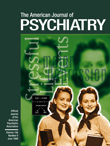Causal Relationship Between Stressful Life Events and the Onset of Major Depression
Abstract
OBJECTIVE: Stressful life events are associated with the onset of episodes of major depression. However, exposure to stressful life events is influenced by genetic factors, and these factors are correlated with those that predispose to major depression. The aim of this study was to clarify the degree to which stressful life events cause major depression. METHOD: The authors assessed the occurrence of 15 classes of stressful life events and the onset of DSM-III-R major depression over a 1-year period in female twins ascertained from a population-based registry. The sample contained 24,648 person-months and 316 onsets of major depression. Stressful life events were individually rated on contextual threat and dependence (the degree to which the stressful life event could have resulted from the respondent’s behavior). The nature of the relationship between stressful life events and major depression was tested by 1) discrete-time survival analysis examining the relationship between dependence and the depressogenic effect of stressful life events and 2) a co-twin control analysis. RESULTS: While independent stressful life events were significantly associated with onsets of depression, when level of threat was controlled, the association was significantly stronger for dependent events. The odds ratio for onset of major depression in the month of a stressful life event was 5.64 in all subjects, 4.52 within dizygotic pairs, and 3.58 within monozygotic pairs. CONCLUSIONS: Stressful life events have a substantial causal relationship with the onset of episodes of major depression. However, about one-third of the association between stressful life events and onsets of depression is noncausal, since individuals predisposed to major depression select themselves into high-risk environments.



